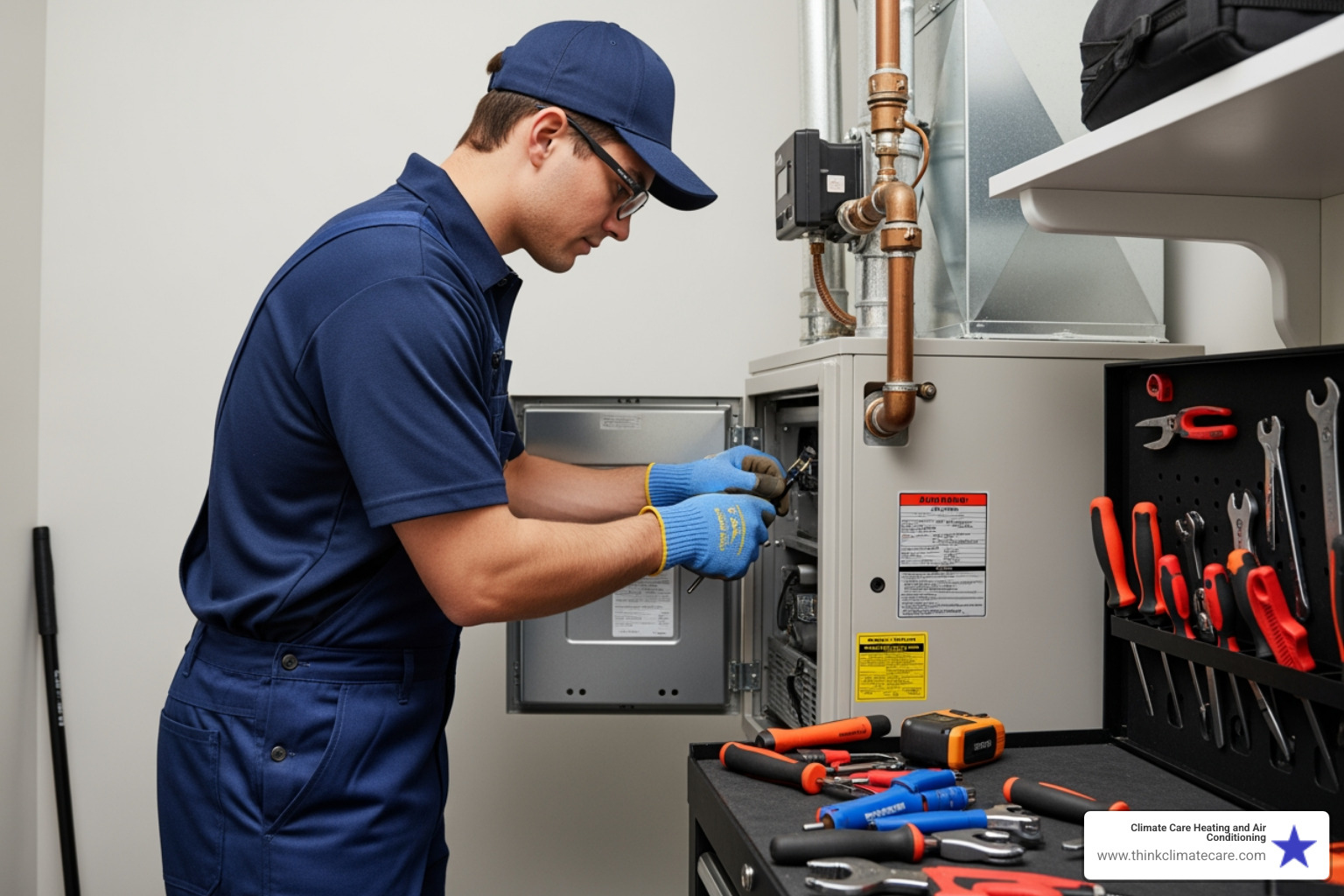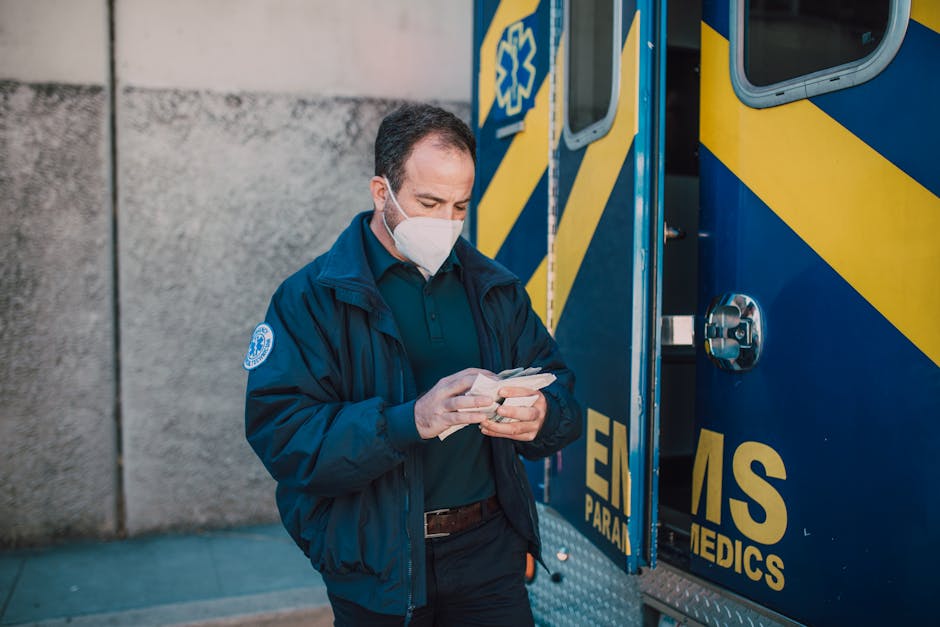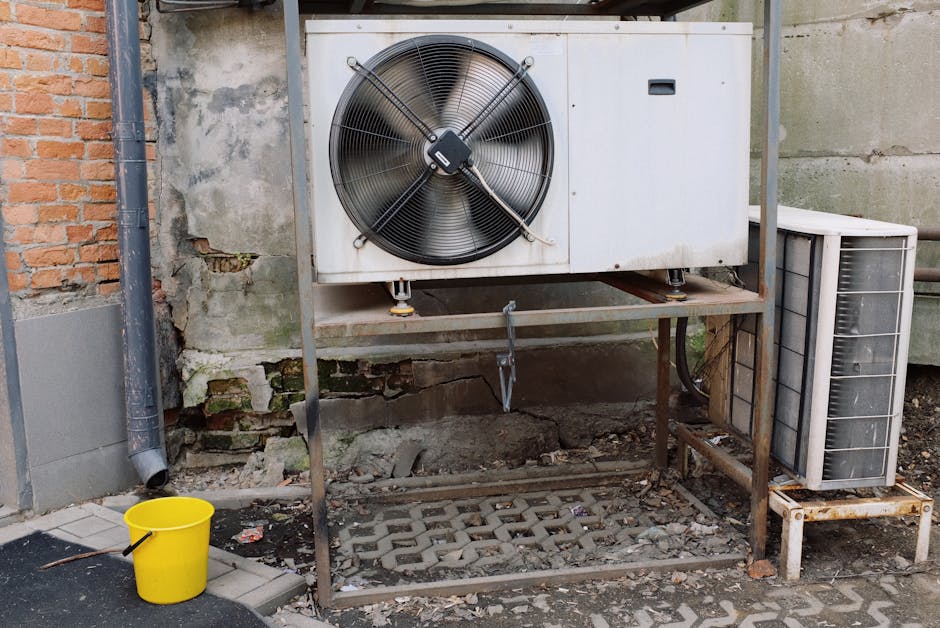The Hot Truth: What to Do When Your AC Isn't Cooling
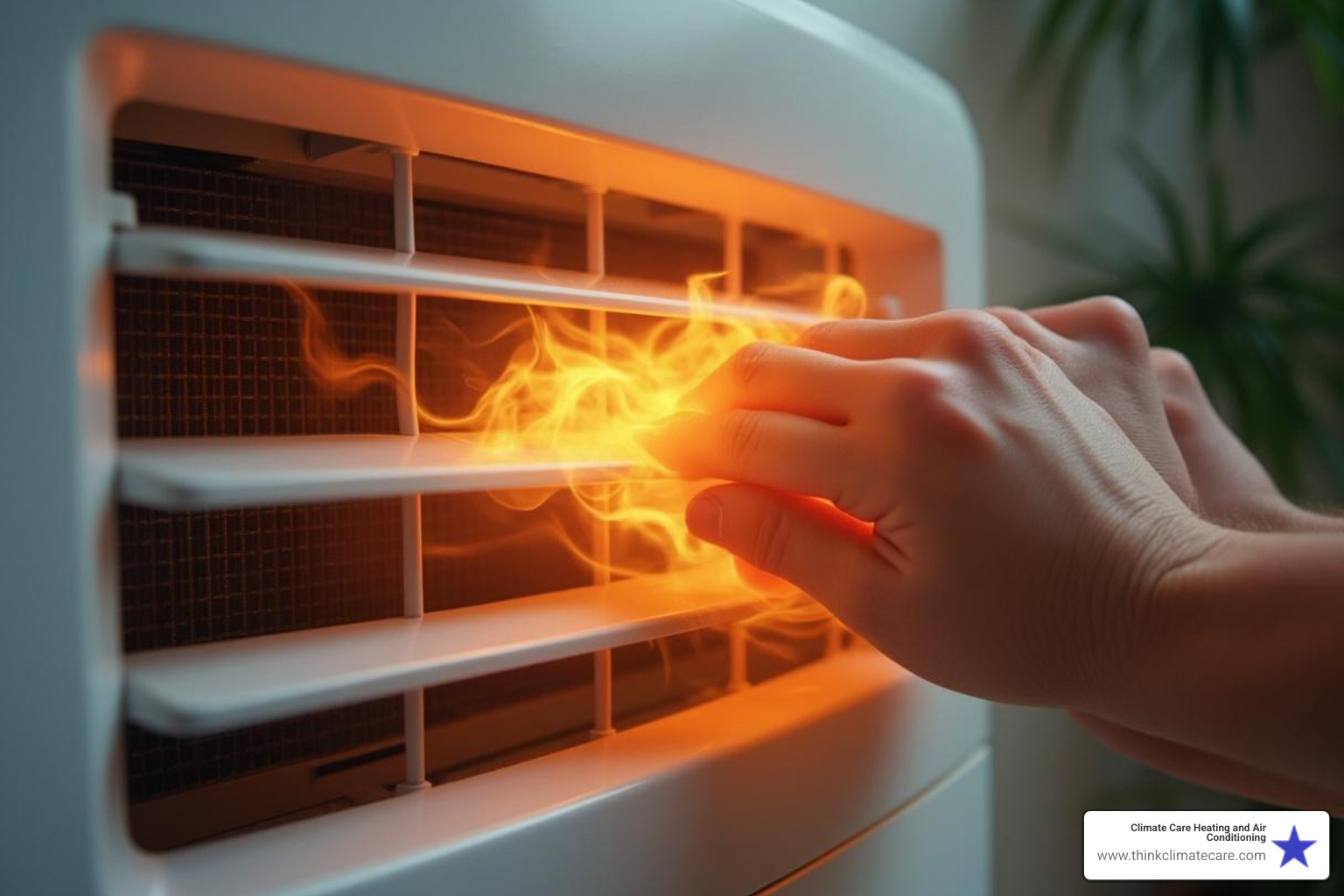
When Your Cool Comfort Turns Into Hot Frustration
Nothing ruins a hot summer day quite like finding your AC blowing hot air when you need cool relief most. Instead of a refreshing blast of cold air, you feel warm or even hot air flowing into your home.
Quick Answer: Common causes of an AC blowing hot air include:
- Incorrect thermostat settings (set to heat instead of cool, or fan set to "ON")
- Dirty air filter restricting airflow and causing system overwork
- Tripped circuit breaker or electrical issues cutting power to outdoor unit
- Low refrigerant levels due to leaks in the system
- Frozen evaporator coils from poor airflow or refrigerant problems
- Failed compressor or other major component breakdown
The good news is that some of these issues have simple fixes you can handle yourself. However, problems like refrigerant leaks or electrical failures require professional help to avoid safety risks and costly damage.
This guide walks you through the simple checks first, then explains when it's time to call Climate Care Heating and Air Conditioning for professional help.
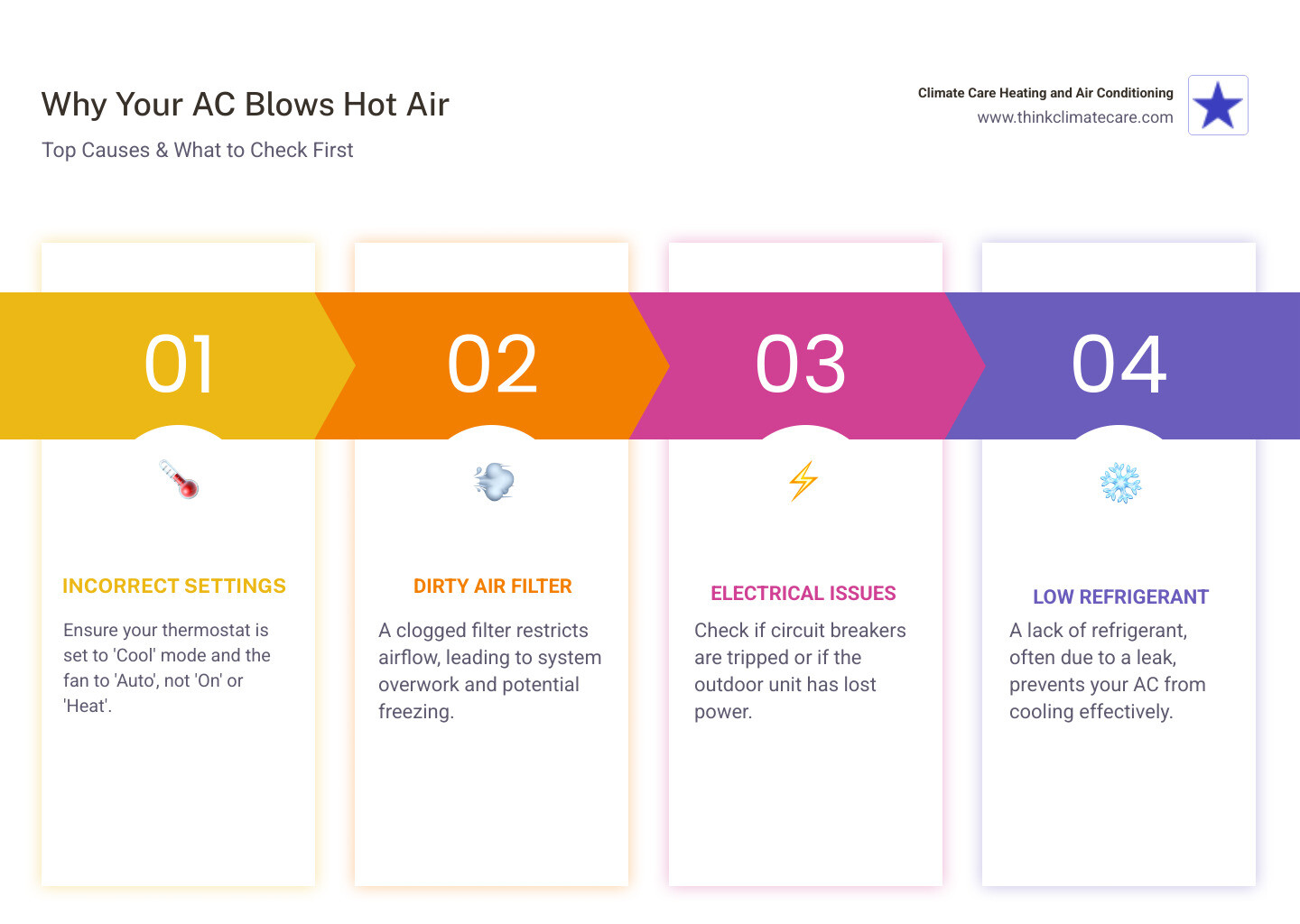
How Your Air Conditioner Cools Your Home
To understand why your AC is blowing hot air, it helps to know how it works. Your AC doesn't create cold air; it moves heat from inside your home to the outside. This is done using a chemical called refrigerant in a closed-loop process called the refrigerant cycle. The refrigerant absorbs heat inside and releases it outside. For more details, you can explore How an AC works in depth.
The Key Components
Your AC system has several key parts split between an indoor unit and an outdoor unit.
- Evaporator Coil (Indoor Unit): Warm indoor air blows over this coil. The refrigerant inside absorbs the heat, turning from a liquid to a gas.
- Compressor (Outdoor Unit): This is the heart of the system. It pressurizes the refrigerant gas, increasing its temperature.
- Condenser Coil (Outdoor Unit): A fan blows outdoor air over this coil, allowing the hot refrigerant to release its heat and turn back into a liquid.
- Expansion Valve: This component lowers the pressure and temperature of the liquid refrigerant before it returns to the evaporator coil.
- Blower Fan (Indoor Unit): This fan circulates the cooled air from the evaporator coil through your home's ductwork.
- Thermostat: The system's brain. It reads the room temperature and tells the AC when to turn on or off. Incorrect settings can cause your AC to blow hot air.
When these parts work together, your home stays cool. If one fails, you may find your AC blowing hot air, leading you to wonder Why AC is Not Cooling Properly.
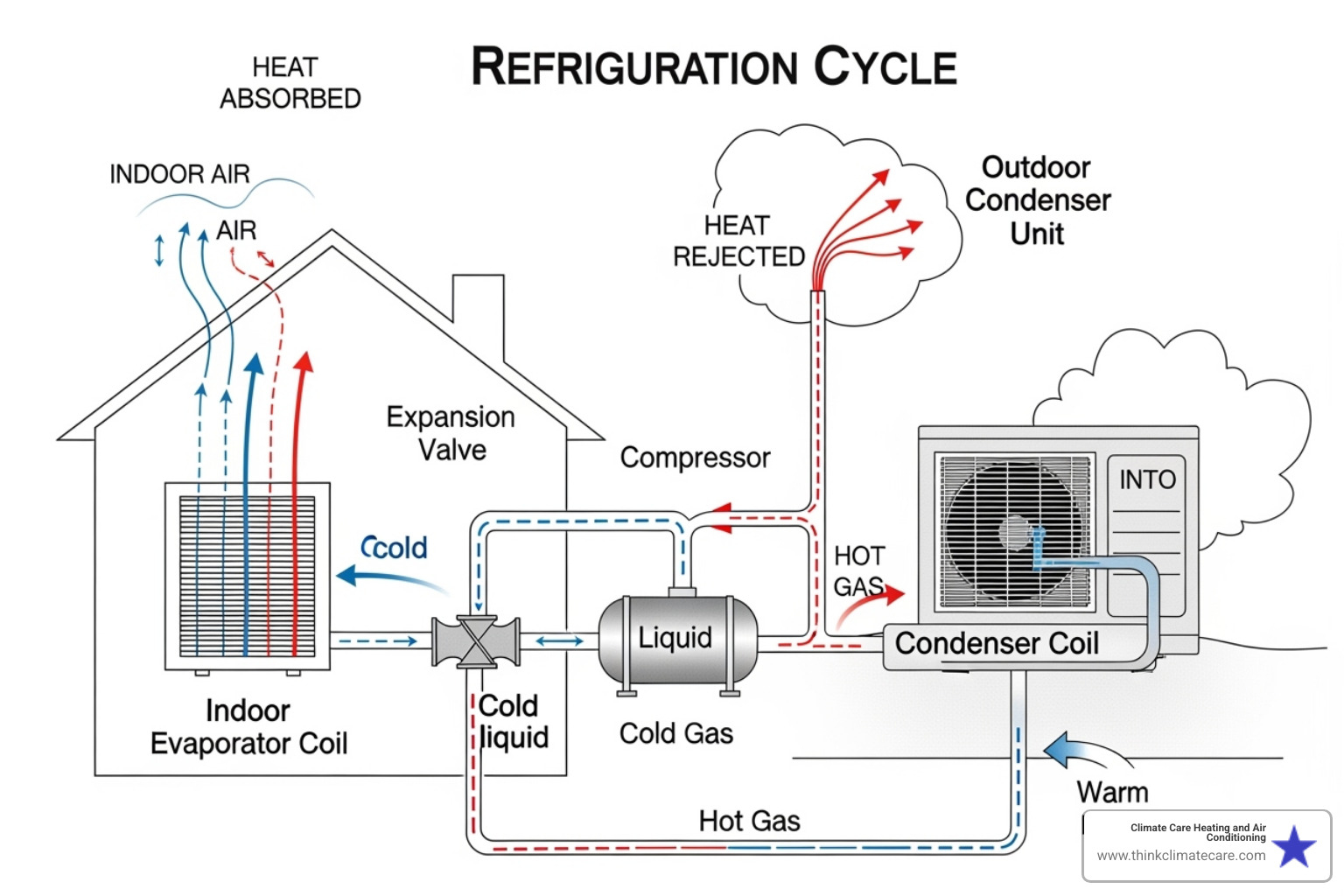
Simple Troubleshooting Steps for Homeowners
If your AC is blowing hot air, don't panic. Before calling for help, you can try several simple troubleshooting steps yourself. These DIY fixes for common issues can save you time and money, as the problem could be as simple as a thermostat setting or a dirty filter.
Safety first: When working with your HVAC system, be cautious of electrical components. Leave any electrical or refrigerant work to professionals. For more tips, read our guide on 8 HVAC Safety Tips for Homeowners.
These initial checks are safe and straightforward. Let's start with the easiest potential solutions.
1. Check Your Thermostat Settings
Before worrying about expensive repairs, check your thermostat. Incorrect settings are a very common reason for an AC blowing hot air.
- Check the Mode: Ensure your thermostat is set to "COOL," not "HEAT" or "OFF." This is a frequent mistake, especially during spring and fall.
- Check the Temperature: Set the temperature a few degrees lower than the current room temperature. If the set temperature is higher than the room temperature, the AC won't turn on.
- Check the Fan Setting: Your fan should be set to "AUTO," not "ON." When set to "ON," the fan runs constantly, circulating uncooled air between cooling cycles, which can feel like your AC is blowing hot air. Setting it to "AUTO" ensures the fan only runs when the system is actively cooling.
- Check the Batteries: If you have a battery-powered thermostat, a blank or flickering screen could mean it needs new batteries.
After making any changes, wait 10-15 minutes for the system to respond before moving to the next step.
2. Inspect and Clean the Air Filter
A clogged air filter is a common culprit when an AC is blowing hot air. The filter traps dust and debris, and when it gets clogged, it restricts airflow, making your system work much harder.
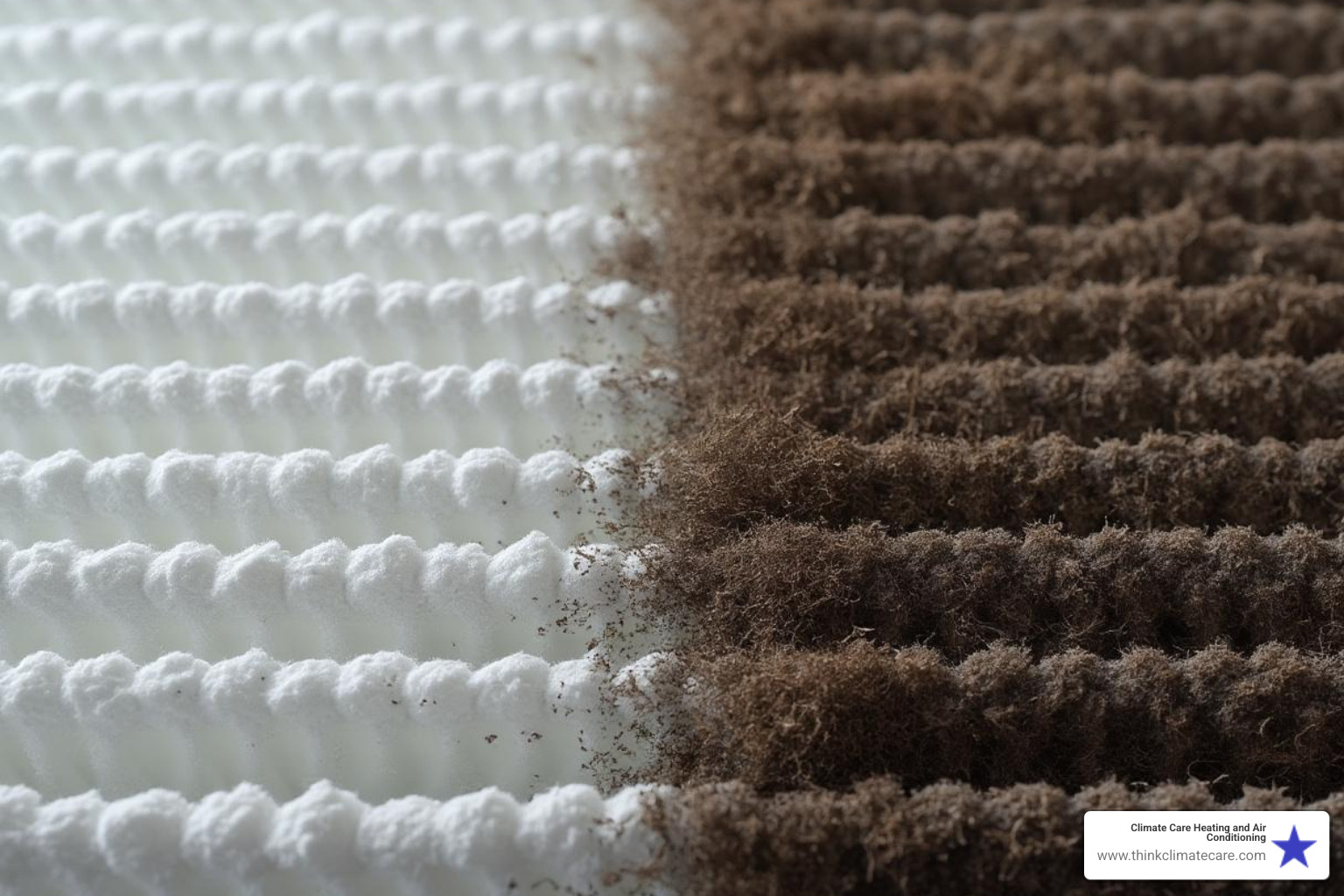
A dirty filter leads to several problems:
- Restricted Airflow: Not enough warm air reaches the evaporator coil, so the system can't cool effectively.
- System Overwork: The blower motor strains to pull air through the clog, increasing energy use and wear on components.
- Frozen Coils: Poor airflow can cause the evaporator coil to get too cold and freeze. A frozen coil can't absorb heat, resulting in your AC blowing hot air.
Luckily, this is an easy fix. Check your filter monthly and replace it at least every three months (more often if you have pets or allergies). A clean filter is a simple way to prevent major issues. For more tips, see our guide on How to Thoroughly Clean Your HVAC System for the New Year.
3. Examine the Outdoor Unit and Power Supply
If the thermostat and filter are fine, check your outdoor condenser unit. Power issues or blockages here can cause your AC to blow hot air.
- Check the Circuit Breaker: Your outdoor unit has a dedicated circuit breaker in your home's main electrical panel. An electrical surge can cause it to trip. Find the breaker labeled "AC" or "HVAC." If it's tripped, flip it fully "OFF," then back "ON." Caution: If the breaker trips again, do not reset it. This indicates a serious electrical problem that requires a professional. Learn more about why your AC Circuit Breaker Keeps Tripping.
- Check the Outdoor Disconnect Switch: Near the outdoor unit is a power disconnect switch, usually in a small box on the wall. Ensure this switch is in the "ON" position.
- Clean the Outdoor Unit: The condenser coils release heat, but can't do so if they're covered in dirt, leaves, or grass clippings. To clean it, turn off the power at the breaker and the disconnect switch. Gently rinse the coils with a garden hose. Also, clear any debris, weeds, or bushes within a two-foot radius of the unit to ensure proper airflow.
- Check the Condenser Fan: The fan on top of the unit pulls air over the coils. If the unit is humming but the fan isn't spinning, it can't release heat. Turn off the power immediately and call a professional if the fan is not working.
Why Your AC is Blowing Hot Air: Deeper Problems
If the simple fixes don't work, your AC blowing hot air may be due to a more complex problem requiring a professional. Addressing these issues promptly can prevent further damage. For more signs, see our list of 10 Indicators You Need Professional AC Repair.
Refrigerant Leaks and Low Levels
Refrigerant is essential for cooling. It's not consumed like fuel, so low levels mean there's a leak. This is a common cause of an AC blowing hot air.
- Signs of Low Refrigerant:
- Warm air from your vents.
- Hissing or gurgling sounds near the AC units.
- Ice buildup on the refrigerant line or evaporator coil.
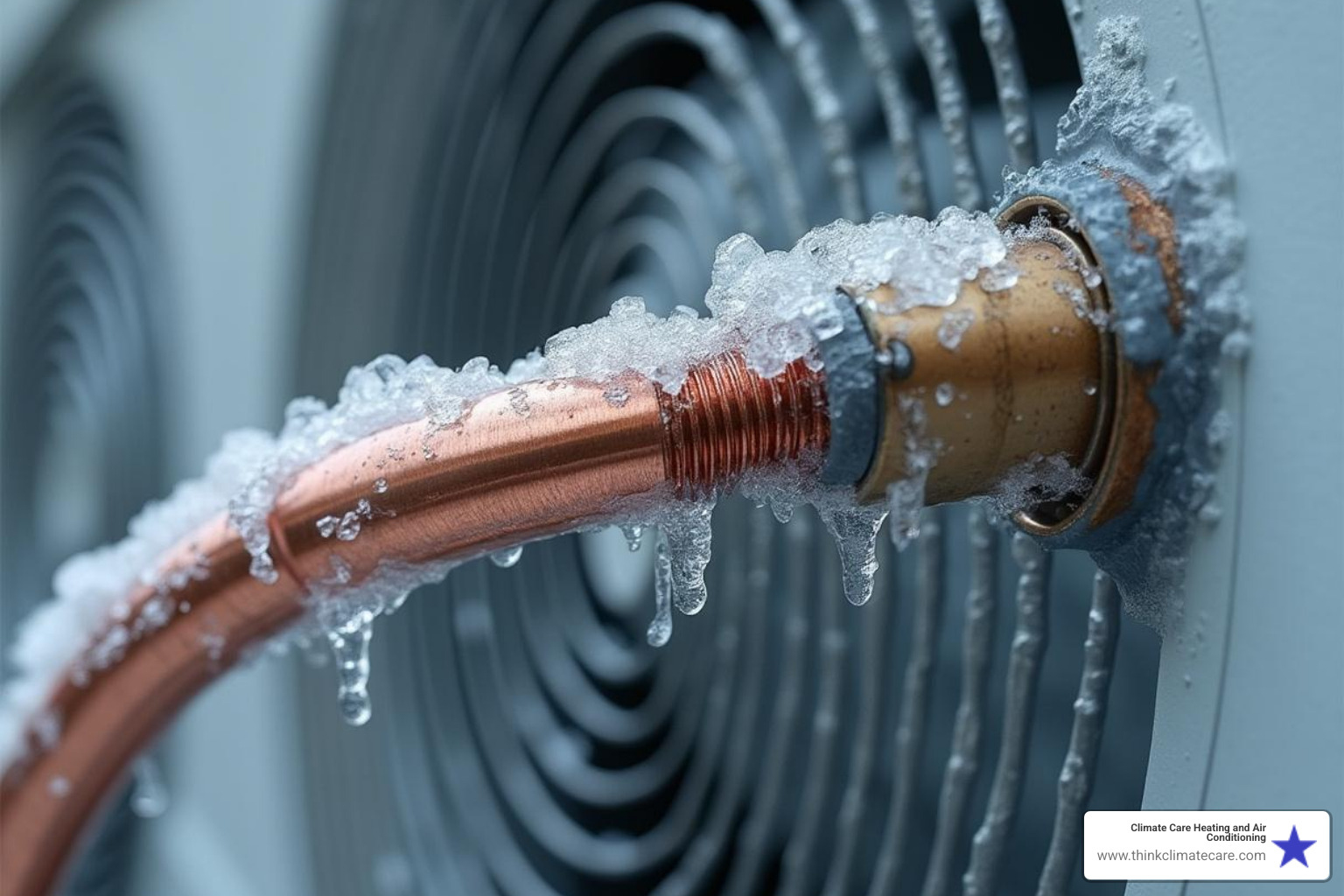
Professional Repair is Necessary: Refrigerant is a regulated chemical that requires certified technicians to handle. If you suspect a leak, call a professional. A technician should find and fix the leak, not just refill the refrigerant, which is only a temporary fix. Learn more about Solving Refrigerant Line Problems in AC System.
Frozen Evaporator Coils
A frozen evaporator coil prevents heat absorption and blocks airflow, resulting in your AC blowing hot air or weak airflow.
- Causes of a Frozen Coil:
- Restricted Airflow: Usually from a dirty air filter or blocked vents.
- Low Refrigerant Levels: Causes the coil to run too cold.
- Clogged Condensate Drain Line: Backed-up water can freeze on the coil.
How to Thaw a Frozen Coil: If your coil is frozen, turn off the AC's cooling function but set the fan to "ON" to circulate air and melt the ice. This can take several hours. After it thaws, check your air filter and vents. If the coil freezes again, call a professional to diagnose the root cause. Read more about Why AC Coils Keep Freezing in Summer Heat.
Electrical and Compressor Failure
Failures in your AC's electrical system can cause it to blow hot air. Common issues beyond a tripped breaker include:
- Failed Capacitor: The fan or compressor may hum but won't start.
- Worn Contactor: The outdoor unit won't receive power to turn on.
- Blower Motor Issues: The indoor fan won't circulate cooled air.
The compressor is the heart of your AC; if it fails, the system stops cooling. This is a serious and expensive repair, often caused by age or lack of maintenance. Signs include loud grinding noises or the unit humming without cooling. Diagnosing and repairing electrical or compressor issues requires a professional. For more details, see our guide on HVAC Electrical Problems Homeowners Should Watch For.
Repair Costs and The Power of Prevention
When your AC is blowing hot air, repair costs are a major concern. While simple DIY fixes are free, professional repairs for common issues like a faulty capacitor or a minor refrigerant leak typically range from $150 to $600. Major failures, like a broken compressor, can be much more expensive. If your AC is over 15 years old, a major repair might mean it's more cost-effective to replace the unit.
The Power of Prevention
Regular professional maintenance is the best way to prevent sudden, costly AC breakdowns. Our maintenance service helps prevent your AC from blowing hot air by catching problems early. We clean coils, check refrigerant, inspect electrical parts, and optimize your system's performance.
Routine maintenance also improves energy efficiency, lowers utility bills, extends your AC's lifespan, and ensures reliable indoor comfort.
Climate Care Heating and Air Conditioning offers comprehensive maintenance plans for peace of mind. Our Maintenance Plan provides savings and priority service for homeowners in Manteca, CA, and surrounding areas. Our holistic approach focuses on performance, cost-efficiency, and environmental standards. Learn how Preventive AC Maintenance: How It Can Help Avoid Costly Repairs and keep your cool all season.
Frequently Asked Questions about an AC Blowing Hot Air
It's understandable to have questions when your AC is blowing hot air. Here are some common ones.
Should I turn my AC off if it's blowing hot air?
Yes, you should turn your AC off immediately. Continuing to run it can cause more severe damage, especially to the compressor, which is an expensive component to replace. Turning the system off prevents further damage, saves energy, and allows you to safely perform basic troubleshooting.
How much does it cost to fix an AC that blows hot air?
The cost varies depending on the cause. Simple DIY fixes like changing a filter are free. Professional repairs for common issues like a faulty capacitor or a minor refrigerant leak typically range from $150 to $600. However, a major problem like a failed compressor can cost significantly more, sometimes making a full system replacement a more sensible option for older units. The best way to know the cost is to get a diagnosis from a qualified technician.
How can I reset my air conditioner?
A simple reset can sometimes resolve minor glitches. Here are a few ways to do it:
- Power Cycle at the Thermostat: Turn the thermostat to the "OFF" position for 5-10 minutes, then switch it back to "COOL."
- Circuit Breaker Reset: For a hard reset, go to your main electrical panel. Find the breaker for your "AC" or "HVAC," flip it to "OFF," wait one minute, and then flip it back "ON."
- Outdoor Disconnect Switch: You can also reset power to the outdoor unit by turning its nearby disconnect switch off for a minute and then back on.
After a reset, wait 15-20 minutes for the system to restart. If it still blows warm air or the breaker trips again, it's time to call a professional.
Get Your Cool Back with Professional Help
We hope this guide has empowered you to troubleshoot your AC. By checking your thermostat, air filter, and outdoor unit, you may have already solved the problem.
However, if your AC is blowing hot air due to a more complex issue like a refrigerant leak, frozen coil, electrical fault, or compressor failure, it's time to call a professional. These problems require specialized tools and expertise to fix safely and correctly. Attempting a DIY repair could cause more damage or void your warranty.
That's where Climate Care Heating and Air Conditioning comes in. We provide holistic HVAC care, focusing on performance, energy savings, and environmental responsibility. Our expert technicians can diagnose and repair any AC issue, ensuring your home stays cool and your system runs reliably.
We are proud to be the trusted comfort specialists for homeowners across the Central Valley, including Manteca, Sacramento, and communities like Antelope, Carmichael, Ceres, Citrus Heights, Elk Grove, Elverta, Escalon, Fair Oaks, Folsom, French Camp, Galt, Lathrop, Lodi, Modesto, Mountain House, Natomas, North Highlands, Oakdale, Orangevale, Patterson, Rancho Cordova, Rio Linda, Ripon, Riverbank, Rocklin, Roseville, Salida, Stockton, Tracy, Turlock, and Woodbridge.
If the DIY steps didn't work and your AC is still blowing hot air, don't wait. We are ready to restore your comfort. Schedule AC Repair in Sacramento or contact us for service in any of our other locations. We look forward to bringing comfort back to your home.
Customer Testimonials
Our customers love our service and support.











